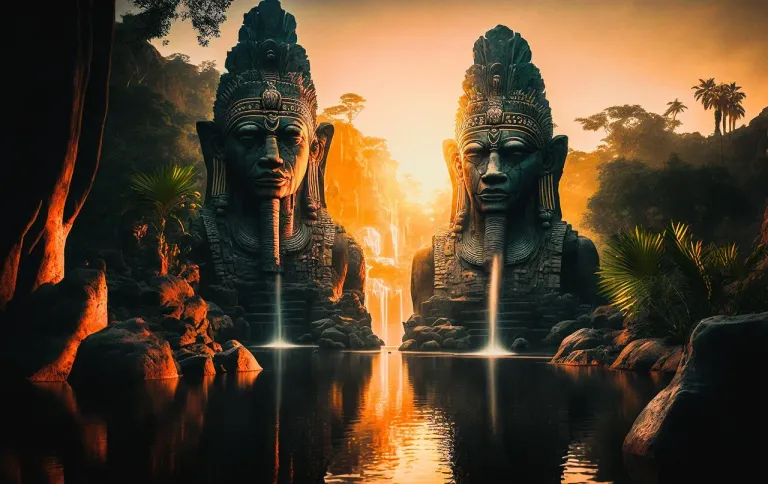Atlantis — Lost Civilization or Forbidden History?
Atlantis — Lost Civilization or Forbidden History?
Beneath the waves of time lies a story too vast, too mysterious, and perhaps too dangerous for mainstream history to embrace — the legend of Atlantis. First mentioned by the Greek philosopher Plato in his dialogues Timaeus and Critias, Atlantis has captured the imagination of seekers, scholars, and skeptics for millennia. Was it merely allegory? Or was Plato preserving a memory far older than classical Greece — a memory of a sunken world that once illuminated the ancient Earth?
Plato’s Atlantis — Fact Hidden as Fiction?
Plato described Atlantis as a powerful, technologically advanced civilization that existed over 9,000 years before his time. According to the story, it lay beyond the Pillars of Hercules (now thought to be the Strait of Gibraltar). It possessed massive temples, gold-lined walls, a highly organized society, and knowledge that dwarfed even that of the Greeks.
Plato claimed this account came from his ancestor Solon, who in turn received it from Egyptian priests. The Egyptians, he said, remembered vast cycles of human civilization — cycles that had been wiped out by floods, fire, and earth-shaking catastrophes. The destruction of Atlantis, according to this telling, came in a single day and night of misfortune — swallowed by the sea for its arrogance and corruption.
Mainstream academia has long dismissed Plato’s tale as allegory. But what if his account preserved a real memory, passed down through the initiatory schools of Egypt? Could Atlantis have been a real place — and the origin point for much of humanity’s ancient knowledge?
**
Traces of Atlantis in Egypt, Sumer, and Beyond**
If Atlantis existed, where did its survivors go? Many alternative historians and researchers suggest they didn’t vanish — they migrated. Following the cataclysm, these survivors may have traveled east into Egypt and Mesopotamia, or west into the Americas, bringing with them the seeds of civilization.
It’s a compelling theory. Ancient Egypt appeared suddenly, fully formed, with knowledge of astronomy, mathematics, medicine, and architecture. Summer, too, rose abruptly, with complex writing systems, irrigation, ziggurats, and sophisticated law codes. Both civilizations speak of gods — or sky beings — who taught humanity the arts of civilization.
Could these “gods” have been Atlantean survivors, mistaken for divine beings by the more primitive societies they encountered?
Advanced Knowledge in Unexpected Places
The remnants of megalithic architecture — not just in Egypt and Sumer, but across the world — hint at a forgotten era of engineering prowess. The massive stones of Baalbek in Lebanon, the polygonal walls of Peru, the submerged structures off the coast of Japan, and the global presence of pyramid-like constructions suggest a shared legacy. This knowledge appears too advanced for the timeframes in which they are traditionally dated.
How did people thousands of years ago move stones weighing hundreds of tons with no evidence of the tools or techniques required? The answer may lie in a civilization before Egypt — one capable of manipulating energy, sound, or gravity in ways we can’t yet replicate. One like Atlantis.
The Global Flood Myths
From the biblical story of Noah to the Sumerian Epic of Gilgamesh, from Hindu scriptures to Native American legends, cultures across the planet remember a great flood. These myths almost universally involve divine warning, the survival of a chosen few, and a post-cataclysmic rebirth of humanity.
Plato’s tale of Atlantis fits perfectly into this global pattern — suggesting that these stories are not disconnected fiction, but regional memories of a single, real event. An event that may have marked the end of the Atlantean age and the beginning of our fragmented history.
A Forbidden Legacy
Why would the history of Atlantis be suppressed? Some argue that acknowledging Atlantis — and the advanced knowledge it represents — would challenge the entire foundation of modern historical thought. It would imply that human history is not linear but cyclical, rising and falling with lost epochs of light and darkness.
It would also suggest that the origins of human civilization are not solely terrestrial — that advanced knowledge may have been seeded by beings with origins far from Earth. Beings remembered as gods, teachers, or even extraterrestrials.
Hiding in Plain Sight
Is it possible that the memory of Atlantis survives in the sacred geometry of ancient temples, in the alignment of pyramids, or the myths passed down from priest to prophet? Might the Atlantean legacy still influence our culture, science, and even our dreams?
Some researchers propose that Atlantis was not just a physical place, but a state of consciousness — a forgotten connection between humanity and the cosmos. If that’s true, rediscovering Atlantis might not require a diving expedition, but a deeper journey inward — to unlock what the ancients once knew.
Posted by Waivio guest: @waivio_cosmicsecrets
